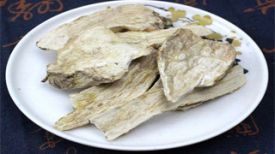Drug name: Xinyi
Nicknames: Wooden Pen Flower, Welcoming Spring
Source: Shennong Bencao Jing
Classification: Antitumor drugs
Origin: Henan, Sichuan, Anhui and other places
Taste: Warm in nature, spicy in taste
Meridian return: return to the lung and stomach meridians
Effect: Dispel wind and cold, clear nose and orifices
Indications: Wind cold headache, nasal abyss, nasal allergy, nasal congestion and runny nose
Character identification: This product is oval shaped, resembling a hairy pen head, with a length of 1.2-2.5cm and a diameter of 0.8-1.5cm. The base often has a short stem, about 5mm long, and there are white punctate pores on the stem. Bracts have 2-3 layers, with 2 per layer. There are small scales between the two layers of bracts. The outer surface of the bracts is densely covered with gray white or gray green hairs, while the inner surface is brownish and hairless. Perianth segments 9, brownish in color, outer perianth segments 3, strip shaped, approximately 1/4 of the length of the inner two rings, in the shape of sepals. Inner two perianth segments 6, 3 per ring, arranged in a wheel shape. The stamens and pistils are mostly arranged in a spiral shape. Lightweight and brittle in texture. The aroma is fragrant, and the taste is spicy, cool, and slightly bitter.
Usage&Taboos for Internal Administration: Jiantang, 3-9g; Xinyi has hair and can easily irritate the throat. It is recommended to use gauze to wrap and fry when adding it to the soup.
External use: In moderation, grind the powder to plug the nose or soak it in water for distillation and nasal drops. Taboos: nasal diseases caused by yin deficiency and excessive fire should be avoided.
pharmacological action
The volatile oil of Xinyi has the effects of constricting nasal mucosal blood vessels and promoting stomach health; The decoction is injected intravenously into anesthetized rabbits, cats, and dogs, and has a antihypertensive effect, but the volatile oil has no antihypertensive effect; Exciting effects on the uterus of animals in vivo and in vitro; It has inhibitory effects on fungi, bacteria, and insects in vitro.
Chinese herbal formula 1: Treating nasal congestion without knowing the fragrance: Sophora sinensis, Magnolia magnolia, Acorus calamus, etc. are divided into powder and gently wrapped in the nose. (New Compilation of Mei's Prescriptions) 2. Treatment for toothache, swelling, or gum rotting: one or two magnolia, two or two snake bed seeds, and five coins of green salt, all of which are mixed together. (Compendium of Materia Medica) 3. To treat nasal leakage, a piece grows in the nostrils: four liang each of Xinyi (hair removed) and Sangbai (honey roasted), one liang each of gardenia, two liang each of Fructus Aurantii, Platycodon grandiflorus, and Angelica dahurica, totaling fine powder. Take two coins per serving, mix with light radish soup. (Complete Collection of Ulcer Doctors)
Ancient book records
Pharmacology: It can treat blisters on the face. Used for facial fat, mainly for radiance.
The Shennong Materia Medica Classic states that the body of the five internal organs is cold and hot with wind, and the mind is painful.
Compendium of Materia Medica: Nasal Abyss, Nasal Allergy, Nasal Suffering, Nasal Ulcers, and Postacne Nasal Ulcers. The Xin Wen of Xinyi can help clear Yang in the stomach and ascend to the head, thus warming the middle and treating diseases of the head, face, nose, and nose.
Traditional Chinese Medicine - Xinyi
Release time:2024-06-03 13:07:13
Reading:186
Word Count:3425
Subscribe to email


